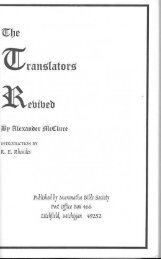THE PINK SWASTIKA - Shattering Denial
THE PINK SWASTIKA - Shattering Denial
THE PINK SWASTIKA - Shattering Denial
Create successful ePaper yourself
Turn your PDF publications into a flip-book with our unique Google optimized e-Paper software.
Crete were each examples of this phenomenon (as are the modern Islamist terror groups). Cantarella<br />
notes that the ancient historian, Plutarch of Chaeronea (50-120 A.D.) wrote of “the sacred battalion” of<br />
Thebans made up of 150 male homosexual pairs (Cantarella:72), and of the legendary Spartan army,<br />
which inducted all twelve-year-old boys into military service where they were “entrusted to lovers<br />
chosen among the best men of adult age.” Plutarch also reports of a Cretan military induction ritual in<br />
which boys were abducted and sexually enslaved for a period of two months by adult pederasts before<br />
receiving their “military kit” (ibid.:7). This last perversion undoubtedly inspired or was inspired by the<br />
Greek myth of Ganymede. Author Jason Berry sheds some light on this apparent derivation:<br />
Certain gods practiced man-boy love as did the bi-sexual male aristocracy; the armies of Thebes and<br />
Sparta were charged with homosexuality as a fire of the male power drive. Pagans in the late [Roman]<br />
Empire adulated gods like Zeus, who abducted and raped Ganymede — a living myth that one<br />
philosopher denounced for influencing those men who ran “marketplaces of immorality and...infamous<br />
resorts for the young for every kind of corrupt pleasure” (Berry:200f).<br />
It is possible that the term “gay” is derived from this mythical Greek figure, Ganymede, cup-bearer<br />
of the gods, who exemplified the concept of man/boy sex to the masculine homosexuals. The British<br />
term “catamite,” meaning the submissive partner in a male homosexual relationship, is derived from<br />
the Roman version of Ganymede, Catamitus. The terms “gay” and “lesbian” (the latter derived from<br />
the name of the Isle of Lesbos in Greece) eventually replaced the terms Urning and Dailing as the<br />
names of choice for homosexuals.<br />
In ancient Greece, as in the masculine homosexual faction in Germany, only the masculine form of<br />
homosexuality was esteemed and all things feminine were despised. The form of homosexuality which<br />
dominated Greek culture was ultramasculine and militaristic. It can be assumed that women, as well as<br />
men who identified with womanly traits and thinking, were considered naturally inferior to the elite<br />
pederasts. Cantarella writes that Plato, in Timaues, went so far as to theorize that women were the<br />
reincarnations of men who had “lived badly” in a previous life (Cantarella:58).<br />
As we will see, the revival of Hellenic paganism became a fundamental aspect of the Nazi identity.<br />
In Nationalism and Sexuality, historian George L. Mosse notes its significance: “The Greek youth, an<br />
important national symbol in the past, reigned supreme during the Third Reich. Hitler’s own taste was<br />
influenced by the neo-classical revival...[which often included] pictures of nude youth...not unlike<br />
those of boys bathing” (Mosse:172). But the Nazis adopted more than just symbolism from the “boylovers”<br />
who reasserted the Greek ideal; their ideas and philosophies are indelibly stamped on the Nazi<br />
regime.<br />
The influence of the Greek homosexuals on Nazi culture is perhaps explained best by contemporary<br />
German psychoanalyst, Wilhelm Reich in his 1933 classic, The Mass Psychology of Fascism:<br />
Among the ancient Greeks, whose written history does not begin until patriarchy has reached a state of<br />
full development, we find the following sexual organization: male supremacy...and along with this the<br />
wives leading an enslaved and wretched existence and figuring solely as birth machines. The male<br />
supremacy of the Platonic era is entirely homosexual...The same principle governs the fascist ideology<br />
of the male strata of Nazi leaders (Bluher, Roehm, etc.). For the fascists, therefore, the return of natural<br />
sexuality is viewed as a sign of decadence, laciviousness, lechery, and sexual filth...the fascists ...affirm<br />
the most severe form of patriarchy and actually reactivate the sexual life of the Platonic era in their<br />
familial form of living...Rosenberg and Bluher [the leading Nazi ideologists] recognize the state solely<br />
as a male state organized on a homosexual basis (Reich:91ff).









